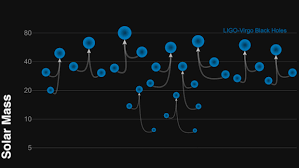Virgin Galactic’s fourth powered test flight of a SpaceShipTwo mothership took two pilots to the edge of space for the first time. The test was all about proving the spaceship is safe and can one day carry tourists.

More than 41 years and nearly 18 billion km from Earth, NASA’s Voyager 2 probe has finally passed beyond the protective bubble defined by the Sun’s magnetic fields and solar wind, joining its sistership Voyager 1 in the interstellar space.

The Chang’e 4 mission lifted off Friday 18:23 GMT (1:23 p.m. EST) from China’s Xichang space center, kicking off a journey that will culminate in an attempt in early January to touch down on the far side of the Moon for the first time.

For the first time in history, we can hear the wind on Mars. With its InSight Lander NASA provided a version of the recording shifted up in pitch, which pulls some of the otherwise-inaudible infrasound into hearing range.

UK researcher, Jamie Farnes, suggests both dark energy and matter can be unified into a single substance — a negative-mass ‘dark fluid.’ The theory may also prove right a prediction that Albert Einstein made 100 years ago.

Japanese scientists utilized a mix of ground and space based telescopes and revealed over 100 new extrasolar planets.

The LIGO and Virgo collaborations have now confidently detected gravitational waves from a total of 10 stellar-mass binary black hole mergers and one merger of neutron stars.
It will map and study the tiny world in great detail, eventually returning a piece of Bennu to Earth in 2023. The discoveries of OSIRIS-REx will shed light on our solar system's ancient history.

An international team of scientists have detected gravitational waves from the biggest known black-hole collision that formed a new black hole about 80 times larger than the Sun.

Many supernovae show a gradual increase in the light they put out. But for ASASSN-18bt, you could clearly see there's something unusual and exciting happening in the early times - an unexpected additional emission.

An important discrepancy in measurements of the universe’s acceleration has theorists wondering whether we’ve gotten something fundamentally wrong in our understanding of the history of the universe.

The Hubble Space Telescope is a hero in the astronomy world - serving 25 years in space. And when it suffered a malfunctioning on October 5th, it took a heroic effort on the part of the Hubble team to get it working again.

InSight spacecraft plunged into the rarefied atmosphere of Mars at a speed of more than 12,000 mph Monday and braked to a gentle touchdown, setting the stage for a two-year surface mission to probe the planet’s deep interior.